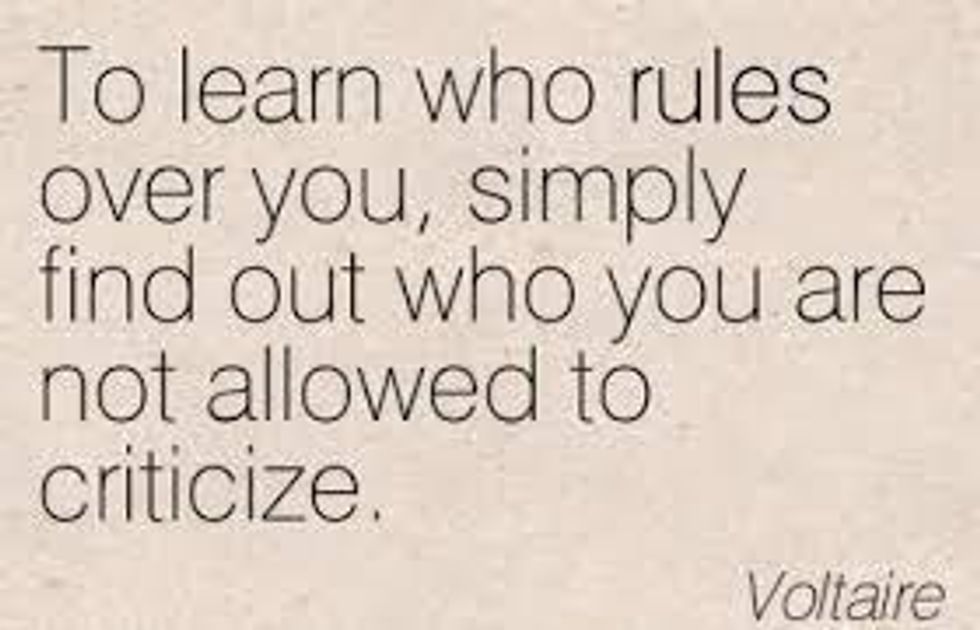For those who spend any time perusing BuzzFeed or Tumblr, I'm sure you have heard the word "mansplain" used quite frequently. The word "mansplaining" is generally used to describe a male who is discussing a subject which he assumes he knows more about than the person (usually a woman) he is addressing. For example, if a man and a woman are talking about climate change and the man interjects to correct a fact that the women misused or is incorrect about, some would consider his interjection "mansplaining." This term, which permits judging people not on their quality of thought but on their gender, has seemed to gain rapid popularity, much to my disgust. Here are 5 reasons why the word "mansplaining" only hurts gender relations.
1. It makes assumptions about people based on their gender. Despite relentless efforts to end gender inequality, one of the most common words used to combat it is actually very harmful. The word "mansplaining" implies that a person's arrogance, whether or not they are actually being arrogant, comes from their gender, not their personality. As we all know, people are greater than their gender, and assuming a man is being arrogant or condescending because of his gender identity rather than his personality is just as problematic as saying a woman who is a bad driver is bad because she has a vagina, not because she may not have been properly taught or is inexperienced.
2. It imposes a double standard to combat a double standard. "Mansplaining" is used to point out the supposed double standard that it is more acceptable to interrupt a woman than a man. How is interrupting and invalidating men going to help women be interrupted less? Treating others with behavior you feel is disrespectful, such as interrupting someone in conversations, will not decrease that behavior in others -- it will just increase it in general.
3. It is a form of censorship. "Mansplaining" does two things which highlight the dangers of censorship. First, it assumes infallibility, meaning that no matter what the man (who is "mansplaining") has said, his discussion partner is right, and therefore the conversation is over. Second, it prevents people from hearing other opinions. If someone hears something they believe is wrong, shutting down the conversation prevents them from challenging it. If they hear something and it changes their views, they will have a better understanding of the subject at hand. However, if they hear no one else's views but their own, they will never broaden their horizons. Omitting others' input will leave individuals to only take into account their own perspective, which is a very dangerous prospect.
4. It genders aggressive communication. I don't know anyone who enjoys being interrupted and disregarded in a conversation. One of the earliest behaviors we are taught in childhood is to wait our turn, and that goes for discussions as well. Anyone who interrupts or neglects to listen to others is called a myriad of negative names, including aggressive. I know people can still struggle with conversation etiquette, both male and female. "Mansplaining" implies that only men are naturally prone to outbursts in conversation and also that men who are interrupted in conversation don't matter. By gendering aggressive behaviors, such as interrupting and condescension, you excuse one gender for that behavior and invalidate another when it happens to them.
5. It implies that women are not capable of handling criticism. One of the most important reasons I do not support the use of "mansplaining" is that it not only invalidates men but it also makes women seem weak. By giving people permission to use, "Oh you're just mansplaining," as a cop-out in an argument, we are supporting the idea that women are too fragile to think of a real counterargument. Instead of women using evidence to back their claims, all they have to do is cry "mansplaining" and they have a get-out-of-jail-free card.
There are many great ways to combat sexism in the world. Equality is a noble goal and certainly one to strive for, but it will take time and thought. We cannot just blame one another for what we don't like. We must look at how our actions affect others, even when those others have wronged us. Equality is a group effort that will take cooperation and listening skills. It will not be achieved by censoring one group of people because you've decided they've had their chance to speak. And it will certainly not be achieved by using made up words to shame and invalidate others.






















